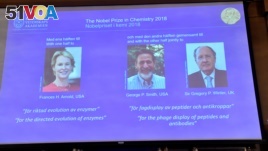03 October, 2018
Two Americans and one Briton have won the 2018 Nobel Prize for Chemistry for developing new processes used to create drugs, chemicals and biofuels.
Frances Arnold of the California Institute of Technology will receive half the prize, worth about $1 million. The other half will be shared by George Smith of the University of Missouri and Gregory Winter of the MRC Molecular Biology Laboratory in Cambridge, England.
Academy: directed evolution
The Swedish Royal Academy of Sciences said Arnold used the processes of natural selection to create enzymes. Enzymes are complex proteins that make many chemical reactions possible.

Pictures of the 2018 Nobel Prize laureates for chemistry: Frances H. Arnold of the United States, George P. Smith of the United States and Gregory P. Winter of Britain are displayed on a screen during the announcement at the Royal Swedish Academy of Sciences. (Jonas Ekstromer/TT News Agency/via REUTERS)
The academy described the process as being similar to biological evolution. It said the Nobel winners applied "the power of evolution and used the same principles – genetic change and selection – to develop proteins that solve mankind's chemical problems."
Arnold first tested her method of what has been called "directed evolution" in 1993. Others now commonly use it to create new enzymes. These enzymes can be used in chemical processes that produce medicines. They also can be used to help create chemicals that are safe for the environment and to make biofuels.
New biological proteins
The other half of this year's Nobel Prize for Chemistry will be shared by George Smith and Gregory Winter.
Smith developed a method to make new biological proteins in 1985. Smith's method is known as "phage display." In this process, viruses that can infect bacteria, known as bacteriophages, are used to produce new proteins that are not believed to exist in nature.
Winter used Smith's phage display method to create new kinds of antibodies. Antibodies are proteins that help fight infection in the body. Winter's aim was to use "phage display" to make new medicines.
The first medicine based on Smith's and Winter's methods, adalimumab, also known as Humira, was approved by drug officials in 2002. It is a popular way to treat rheumatoid arthritis, some skin diseases and inflammatory bowel diseases. The drug is also costly, creating billions of dollars in sales around the world.
The academy says, in recent years, the phage display method has created antibodies able to do a wide number of health-related tasks. Newly created antibodies can make some poisonous substances safe, fight autoimmune diseases and even cure some forms of cancer.
After learning that he had won the Nobel Prize, Smith spoke to the Associated Press. The 77-year-old chemist said his discoveries could not have been made without the earlier work of many others.
"Very few research breakthroughs are novel. Virtually all of them build on what went on before," he said.
Arnold, who is 62 years old, joins four other women who have won the Nobel Prize for Chemistry.
She spoke to Reuters after hearing that she had won the Nobel Prize.
"Some people breed cats and dogs," she said, "I breed molecules."
The Nobel Prize for Chemistry is one of the five prizes first given in 1901. They were the wish of Swedish industrialist Alfred Nobel, who established the organization that provides money for the prizes. The awards honor discoveries that have provided "the greatest benefit to mankind."
I'm Mario Ritter.
Mario Ritter adapted this story for VOA Learning English from VOA News, AP, Reuters and the Nobel site. Kelly Jean Kelly was the editor.
We want to hear from you. Write to us in the Comments section, and visit 51VOA.COM.
_______________________________________________________________
Words in This Story
selection –n. the process of choosing
principles –n. a basic truth or theory, and idea that forms the basis of something
phage (bacteriophage)–n. a virus that infects and reproduces within bacteria
autoimmune –adj. related to a situation in which tissue is attacked by the body's own immune system
novel –adj. new, different from what has been known before
virtually –adv. almost entirely
breed –v. to keep and take care of animals or plants in order to produce more with similar qualities
benefit –n. a good or helpful effect